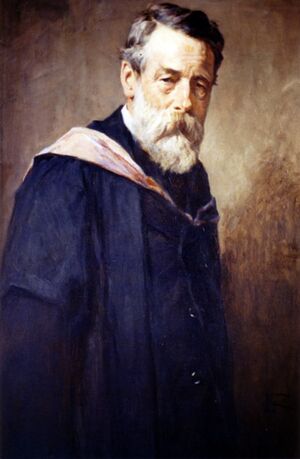James Strachan-Davidson facts for kids
Quick facts for kids
James Strachan-Davidson
|
|
|---|---|

Portrait by George Reid, c. 1911
|
|
| Born |
James Leigh Strachan
22 October 1843 Byfleet, Surrey, England
|
| Died | 28 March 1916 (aged 72) Oxford, England
|
| Burial place | Holywell Cemetery, Oxford |
| Occupation |
|
James Leigh Strachan-Davidson (born Strachan; 22 October 1843 – 28 March 1916) was an English expert in classical studies. He was also a university leader, a translator, and wrote books about Roman history. From 1907 until he passed away in 1916, he was the head, or Master, of Balliol College, Oxford.
Contents
Early Life
James Leigh Strachan was born in Byfleet, Surrey, a place in southern England. His father, James Strachan, was a merchant from Scotland. His mother was Mary Anne Richardson. James was the oldest of three brothers. He also had a half-sister from his father's first marriage.
Sadly, his mother died when he and his brothers were still young. His father later married again. In 1861, James and his father changed their last name to Davidson. This happened when their family inherited a small property in Ardgaith, Perthshire, Scotland.
Education and University Career
James Strachan-Davidson started at Leamington College when he was eleven years old. He was a day student, meaning he went home each night. Even though he wasn't considered very strong, he was good enough at cricket to play on the college team.
In 1862, he went to Balliol College, Oxford, to study the classics. This meant he studied ancient Greek and Roman languages, literature, and history. He did very well in his studies. In 1866, after finishing his exams, he became a fellow of the college. This is a special position for academics.
He graduated from Oxford with top honors in 1864 and 1866. He was very active in the Oxford Union, which is a famous debating society. He served as secretary and librarian. In 1867, he was chosen to be the president of the society.
Teaching and Leadership at Balliol
In 1872, Strachan-Davidson became a classical tutor at Balliol College. He mostly taught about Roman history. In 1875, he became the senior dean of the college. This role meant he was also in charge of the college's Common Room. He would also act as the head of the college when the Master was away.
He was chosen to lead the board of the Faculty of Arts in 1893. The University of Oxford gave him an honorary degree, a Doctor of Civil Law (DCL). This was to recognize his important work on Roman criminal law (laws about crimes).
In 1907, the Master of Balliol College, Edward Caird, retired due to poor health. Strachan-Davidson was chosen by everyone to be the new Master. He held this important position until he died in 1916.
Advice for Government
In 1899, the colonial secretary, Joseph Chamberlain, asked him to join a committee. This committee looked at the situation of students who had scholarships from colonial governments to study in the UK.
Later, in 1903–04, a British official named Lord Cromer asked for his advice. Lord Cromer wanted to know how to teach Arabic to people who were going to work in the government of Egypt and Sudan.
Political Ideas
James Strachan-Davidson often took part in debates at the Oxford Union. He supported ideas like ending Turkish rule in Europe. He also strongly believed in women's suffrage, which means women having the right to vote. He even said that "international morality demanded that England relinquish India", meaning he thought India should be independent from England.
He was a strong supporter of liberal ideas for education and university changes. He believed that a person's character and achievements were more important than their political party.
He was also asked for his advice by the Civil Service Commissioners. This was when they were changing the entrance exam for the Indian Civil Service. He believed that studying ancient history and literature helped people think clearly and understand important ideas. He wrote a paper about this in 1913.
Personal Life
Strachan-Davidson was very dedicated to his work at Balliol College. He never married. He believed that the college should be like "wife and children" to a college fellow.
He was good friends with the English author Paul Ferdinand Willert. He was also the godfather to Willert's daughter, Dorothy. He was close to his family doctor, Robert Slack, and was godfather to his daughter, Mary. He had another goddaughter named Margaret Bowlby. His closest friend was Evelyn Abbott, another expert in classical studies. They spent most of their holidays together.
Death and Legacy
James Strachan-Davidson passed away on 28 March 1916. He died due to an illness and was buried in Holywell Cemetery in Oxford. A special bronze plaque was placed in Balliol Chapel to remember him.
During his many trips to Egypt, Italy, and Sicily, he collected about 1500 to 1600 ancient Greek and Roman coins. These coins were mostly from the Macedonian, Ptolemaic, and Imperial Roman times. When he died, he left this collection to Balliol College. As he wished, the college then gave the coins to the Ashmolean Museum.
Selected Works
Books
- Selections from Polybius (Oxford: Clarendon Press, 1888)
- Cicero and the Fall of the Roman Republic (New York: Putnam, 1894)
- Appian's Civil Wars, Book I (Oxford: Clarendon, 1902)
- Problems of the Roman Criminal Law, 2 vols. (Oxford: Clarendon Press, 1912)
Articles
- "The Growth of Plebeian Privilege at Rome", The English Historical Review, Vol. 1, No. 2 (1886)
- "The Decrees of the Roman Plebs", The English Historical Review, Vol. 5, No. 19 (1890)
- "Mommsen's Roman Criminal Law", The English Historical Review, Vol. 16, No. 62 (1901)
- "Ancient Imperialism – II. Roman Republic", The Classical Review, Vol. 24, No. 4 (1910)
 | Shirley Ann Jackson |
 | Garett Morgan |
 | J. Ernest Wilkins Jr. |
 | Elijah McCoy |

